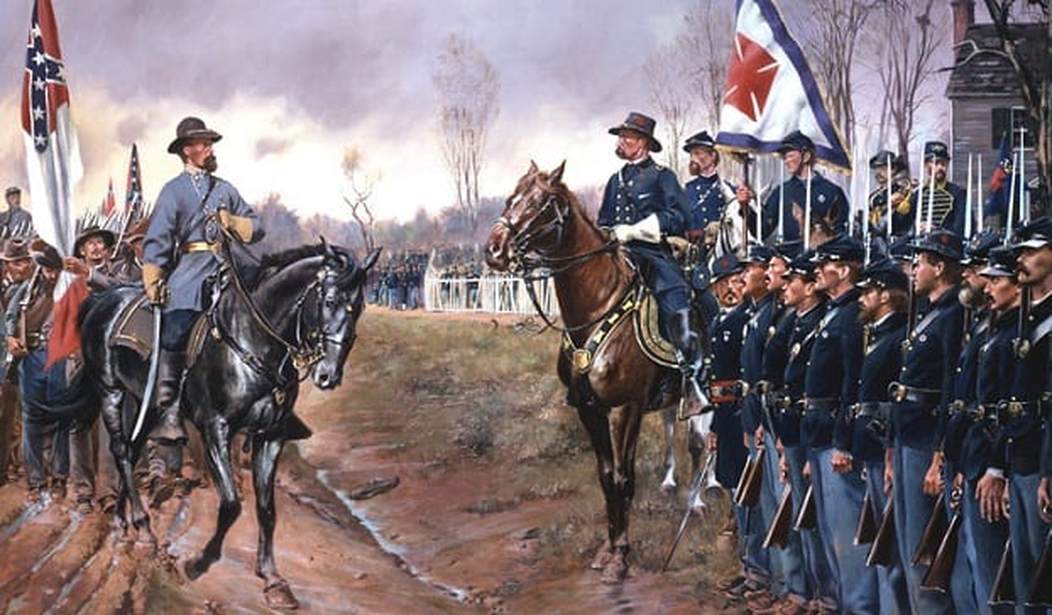Were I asked to pick critical points in American history, points after Independence was a done deal but where the very fate of the Republic teetered on razor’s edge, three would instantly come to mind.
First. Washington’s response to the Newburgh Conspiracy and his subsequent resignation as Commander in Chief.
Second. Washington’s leaving office after two terms.
These two events ensure the United States would not be a military dictatorship and that executive power would be held for a finite period of time. The latter held true until a true progressive, FDR, decided to be president for life.
Third would be the way Lee and Grant handled the surrender at Appomattox.
Exhausted from stress and suffering the pain from a severe headache, Grant replied to Lee around 5 o’clock in the morning of April 9.
April 9th, 1865.
General: Your note of yesterday is received. I have not authority to treat on the subject of peace. The meeting proposed for 10 A.M. to-day could lead to no good. I will state, however, that I am equally desirous for peace with yourself, and the whole North entertains the same feeling. The terms upon which peace can be had are well understood. By the South laying down their arms, they would hasten that most desirable event, save thousands of human lives, and hundreds of millions of property not yet destroyed. Seriously hoping that all our difficulties may be settled without the loss of another life, I subscribe myself, etc.,
U.S. Grant, Lieutenant-General
Lee, now seeing that his hope of slipping away from Grant was in ruins convened a council of war to discuss surrender with his generals.
Early on the morning of April 9, Lee called a conference with his generals so they could give their opinions on surrender. All of them concurred that under the circumstances surrender was the only option, except the young Brigadier General Edward Alexander, who, writes Foote, “proposed that the troops take to the woods, individually and in small groups, under orders to report to the governors of their respective states. That way, he believed, two thirds of the army would avoid capture by the Yankees.”
Lee gently rebuked Alexander, reminding him, “We must consider its effect on the country as a whole.” The men, he said, “would be without rations and under no control of officers. They would be compelled to rob and steal in order to live. They would become mere bands of marauders, and the enemy’s cavalry would pursue them and overrun many sections that may never have occasion to visit. We would bring on a state of affairs it would take the country years to recover from.” Alexander would later write: “I had not a single word to say in reply. He had answered my suggestion from a plane so far above it that I was ashamed of having made it.”
Still suffering his headache, General Grant approached the crossroads of Appomattox Court House where he was over taken by a messenger carrying Lee’s reply.
April 9th, 1865.
General: I received your note of this morning on the picket-line, whither I had come to meet you and ascertain definitely what terms were embraced in your proposal of yesterday with reference to the surrender of this army. I now ask an interview, in accordance with the offer contained in your letter of yesterday, for that purpose.
R.E. Lee, General.
Grant immediately dismounted, sat by the road and wrote the following reply to Lee.
April 9th, 1865.
General R. E. Lee Commanding C. S. Army:
Your note of this date is but this moment (11:50 A.M.) received, in consequence of my having passed from the Richmond and Lynchburg road to the Farmville and Lynchburg road. I am at this writing about four miles west of Walker’s Church, and will push forward to the front for the purpose of meeting you. Notice sent to me on this road where you wish the interview to take place will meet me.
U. S. Grant, Lieutenant-General.
The meeting at the McLean house
The location of the meeting was left to Lee’s discretion. Lt. Colonel Orville E . Babcock and his orderly, Capt. Dunn, took Grant’s reply and rode ahead. Babcock found Lee resting under an apple tree near the Appomattox River. After reading Grant’s letter, Lee, his Aide-de-Camp Lt. Colonel Charles Marshall, and Private Joshua O. Johns rode toward Appomattox Court House accompanied by Federal Officers Lt. Col. Babcock and Capt. William McKee Dunn. Marshall and Johns rode ahead of Lee in order to find a place for the generals to confer. As Marshall passed through the village he saw Wilmer McLean in the vicinity of the courthouse. He asked McLean if he knew of a suitable location, and McLean took him to an empty structure that was without furniture. Marshall immediately rejected this offer. Then McLean offered his own home. After seeing the comfortable country abode, Marshall readily accepted and sent Private Johns back to inform General Lee that a meeting site had been found.
Lee arrived at the McLean house about one o’clock and took a seat in the parlor. A half hour later, the sound of horses on the stage road signalled the approach of General Grant. Entering the house, Grant greeted Lee in the center of the room. The generals presented a contrasting appearance; Lee in a new uniform and Grant in his mud-spattered field uniform. Grant, who remembered meeting Lee once during the Mexican War, asked the Confederate general if he recalled their meeting. Lee replied that he did, and the two conversed in a very cordial manner, for approximately 25 minutes. The subject had not yet gotten around to surrender until finally, Lee, feeling the anguish of defeat, brought Grant’s attention to it. Grant, who later confessed to being embarrassed at having to ask for the surrender from Lee, said simply that the terms would be just as he had outlined them in a previous letter.
The men discussed old times and then got down to business:
General Grant began the conversation by saying ‘I met you once before, General Lee, while we were serving in Mexico, when you came over from General Scott’s headquarters to visit Garland’s brigade, to which I then belonged. I have always remembered your appearance, and I think I should have recognized you anywhere.’
‘Yes,’ replied General Lee, ‘I know I met you on that occasion, and I have often thought of it and tried to recollect how you looked, but I have never been able to recall a single feature.'”
The two generals talked a bit more about Mexico and moved on to a discussion of the terms of the surrender when Lee asked Grant to commit the terms to paper:
“‘Very well,’ replied General Grant, ‘I will write them out.’ And calling for his manifold order-book, he opened it on the table before him and proceeded to write the terms. The leaves had been so prepared that three impressions of the writing were made. He wrote very rapidly, and did not pause until he had finished the sentence ending with ‘officers appointed by me to receive them.’ Then he looked toward Lee, and his eyes seemed to be resting on the handsome sword that hung at that officer’s side. He said afterward that this set him to thinking that it would be an unnecessary humiliation to require officers to surrender their swords, and a great hardship to deprive them of their personal baggage and horses, and after a short pause he wrote the sentence: ‘This will not embrace the side-arms of the officers, nor their private horses or baggage.’
Grant handed the document to Lee. After reviewing it, Lee informed Grant that the Cavalry men and Artillery men in the Confederate Army owned their horses and asked that they keep them. Grant agreed and Lee wrote a letter formally accepting the surrender.
The terms of surrender:
APPOMATTOX COURT-HOUSE, VA.
April 9, 1865General R. E. LEE:
In accordance with the substance of my letter to you of the 8th instant, I propose to receive the surrender of the Army of Northern Virginia on the following terms, to wit: Rolls of all the officers and men to be made in duplicate, one copy to be given to an officer to be designated by me, the other to be retained by such officer or officers as you may designate. The officers to give their individual paroles not to take up arms against the Government of the United States until properly exchanged; and each company or regimental commander sign a like parole for the men of their commands. The arms, artillery, and public property to be parked and stacked, and turned over to the officers appointed by me to receive them. This will not embrace the side-arms of the officers, nor their private horses or baggage. This done, each officer and man will be allowed to return to his home, not to be disturbed by U. S. authority so long as they observe their paroles and the laws in force where they may reside.
U.S. GRANT,
Lieutenant-General.
Lee responded:
HEADQUARTERS ARMY OF NORTHERN VIRGINIA,
April 9, 1865Lieut. Gen. U. S. GRANT:
I have received your letter of this date containing the terms of surrender of the Army of Northern Virginia as proposed by you. As they are substantially the same as those expressed in your letter of the 8th instant, they are accepted. I will proceed to designate the proper officers to carry the stipulations into effect.
R. E. LEE,
General.
At four p.m. Lee departed McClean house to carry the news of surrender to his army. What followed was even more magnanimous than the terms themselves:
The surrender completed, the two generals saluted somberly and parted. “This will live in history,” said one of Grant’s aides. But the Union commander seemed distracted. Having given birth to a reunited nation, he experienced a post-partum melancholy. “I felt . . . sad and depressed,” Grant wrote, “at the downfall of a foe who had fought so long and valiantly, and had suffered so much for a cause, thought that cause was, I believe, one of the worst for which a people ever fought.” As news of the surrender spread through Union camps, batteries began firing joyful salutes until Grant ordered them stopped. “The war is over,” he said; “the rebels are our countrymen again, and the best sight of rejoicing after the victory will be to abstain from all demonstrations.” To help bring those former rebels back in the Union, Grant sent three days’ rations for 25,000 men across the lines. This perhaps did something to ease the psychological as well as physical pain of Lee’s soldiers.
So did an important symbolic gesture at a formal ceremony three days later when Confederate troops marched up to stack arms and surrender their flags. As they came, many among them shared the sentiments of one officer: “Was this to be the end of all our marching and fighting for the past four years? I could not keep back the tears.” The Union officer in charge of the surrender ceremony was Joshua L. Chamberlain, the fighting professor from Bowdoin who won a medal of honor for Little Round Top, had been twice wounded since then, and was now a major general. Leading the southerners as they marched toward two of Chamberlain’s brigades standing at attention was John B. Gordon, one of Lee’s hardest fighters who now commanded Stonewall Jackson’s old corps. First in line of march behind him was the Stonewall Brigade, five regiments containing 210 ragged survivors of four years of war. As Gordon approached at the head of these men with “his chin drooped to his breast, downhearted and dejected in appearance,” Chamberlain gave a brief order, and a bugle call rang out. Instantly the Union soldiers shifted from order arms to carry arms, the salute of honor. Hearing the sound General Gordon looked up in surprise, and with sudden realization turned smartly to Chamberlain, dipped his sword in salute, and ordered his own men to carry arms. These enemies in many a bloody battle ended the war not with the shame on one side and exultation on the other but with a soldier’s “mutual salutation and farewell. (this event is pictured at the top of the story)“
In one day, Lee decided that no matter what terms Grant demanded that he would not be a party of any prolonged guerrilla war. Grant, with all the cards in his hand, decided to do the hard thing and avoid an Obama-like victory strut and gave Lee terms that would largely ensure the Confederate army accepted the surrender and then treated the defeated army with dignity. Absent those two decisions we could have seen a prolonged and bloody insurgency in the South that would have caused a permanent rift in the nation.
Image: The Last Salute by Don Troiani














Join the conversation as a VIP Member